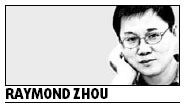
After the successful Olympic opening ceremony, director Zhang Yimou rode a carousal of media interviews. In one of them he revealed that a member of the organizing committee of the 2012 London Games "invited" him to their show. Zhang turned down the offer.
In China, Zhang is the kind of celebrity about whom anything is newsworthy, and this remark instantly gave rise to a debate. Some argued that Zhang should have accepted the offer, using it as another opportunity to "promote Chinese culture", or at least the Chinese way of doing things. One commentator suspected Zhang had fabricated the story to make himself look good.
Well, without calling London for the truth, I'll offer my two cents worth:
First, I don't think Zhang made it up. But I also don't believe London gave him the position equivalent to what he had for the Beijing Games. I guess the London people were impressed with the Beijing show and one of them said something to congratulate him, something like "Hey, it was the greatest Olympics show I've ever seen, and you should come to London to do our show."
Even if the remark was serious rather than perfunctory. One person, no matter how senior, would not have the power to make that kind of decision on the spur of the moment. I don't know what the British decision-making process is, but it is surely more rigid than what Zhang's remark seemed to suggest. Most likely, it was just an invitation to bid for that position.
Nothing could be more natural. Organizers of the Beijing Games invited hundreds of famous artists to bid for it. They whittled the list down to five.
The Chinese language can be beautifully or agonizingly ambiguous, depending on your position. I remember in the early days private enterprises might say they "earned a million bucks" without specifying whether it's revenue or profit. Vagueness prevents one from losing face if you don't want to draw attention to the embarrassment of losing money. It also enhances your "face" when you want to use positive feedback about one tree to cover the whole forest.
Chinese media have a tradition of amplifying good words from outsiders. A Chinese performance in a foreign country is often reported to be "exceptional". Gradually, people at home get the impression that people in that country have never experienced good performing arts.
You might think that with the Internet and so many people learning English it'll be harder for this kind of misunderstanding to occur. On the contrary, things have not got much better. It's just the power of interpreting foreign commentaries have shifted from the few in the traditional media to a few in online media. Those in the traditional media may be politically motivated to focus on the details that suit them, and those in the online media may simply lack the language proficiency to render correctly the original observation, or they may even have personal agendas to be selective.
For example, when a major Internet portal quoted The New York Times "extolling" Guo Jingming as China's "most successful writer", it was obvious the writer did not read or understand the whole piece on NYT. Otherwise, he or she would have known that by "successful" NYT meant selling books, not literary value.
Had portal sites like this wanted to denigrate Zhang, they could have selected one of the rare negative reviews from overseas, translating the vicious remarks out of context and put it in the most visible place on the homepage. Many in China would believe Zhang had flopped disastrously.
E-mail: raymondzhou@chinadaily.com.cn